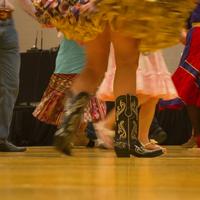
Oct 23, 2019
People have been doing the square dance since before the Declaration of Independence. But does that mean it should be THE American folk dance? That question took us on a journey from Appalachian front porches, to dance classes across our nation, to the halls of Congress, and finally a Kansas City convention center. And along the way, we uncovered a secret history of square dancing that made us see how much of our national identity we could stuff into that square, and what it means for a dance to be of the people, by the people, and for the people.
Special thanks to Jim Mayo, Claude Fowler, Paul Gifford, Jim Maczko, Jim Davis, Paul Moore, Jack Pladdys, Mary Jane Wegener, Kinsey Brooke and Connie Keener.
This episode was reported by Tracie Hunte and produced by Annie McEwen, Tracie Hunte, and Matt Kielty. Mix by Jeremy Bloom.
Support Radiolab today at Radiolab.org/donate.
Check out Phil Jamison's book, “Hoedowns, Reels, and Frolics: Roots and Branches of Southern Appalachian Dance”
Watch this 1948 Lucky Strike Cigarette Square Dancing Commercial
A rare image of Black Square Dancers in 1948
The Square Dance History Project
Read “America’s Wholesome Square Dancing Tradition is a Tool of White Supremacy,” by Robyn Pennachia for Quartz
And Pennachia’s original Twitter thread
Read “The State Folk Dance Conspiracy: Fabricating a National Folk Dance,” by Julianne Mangin